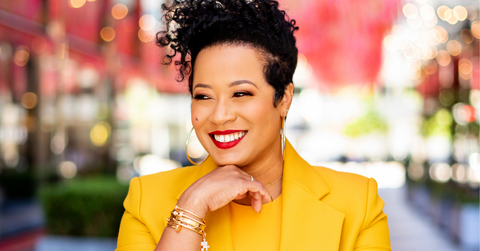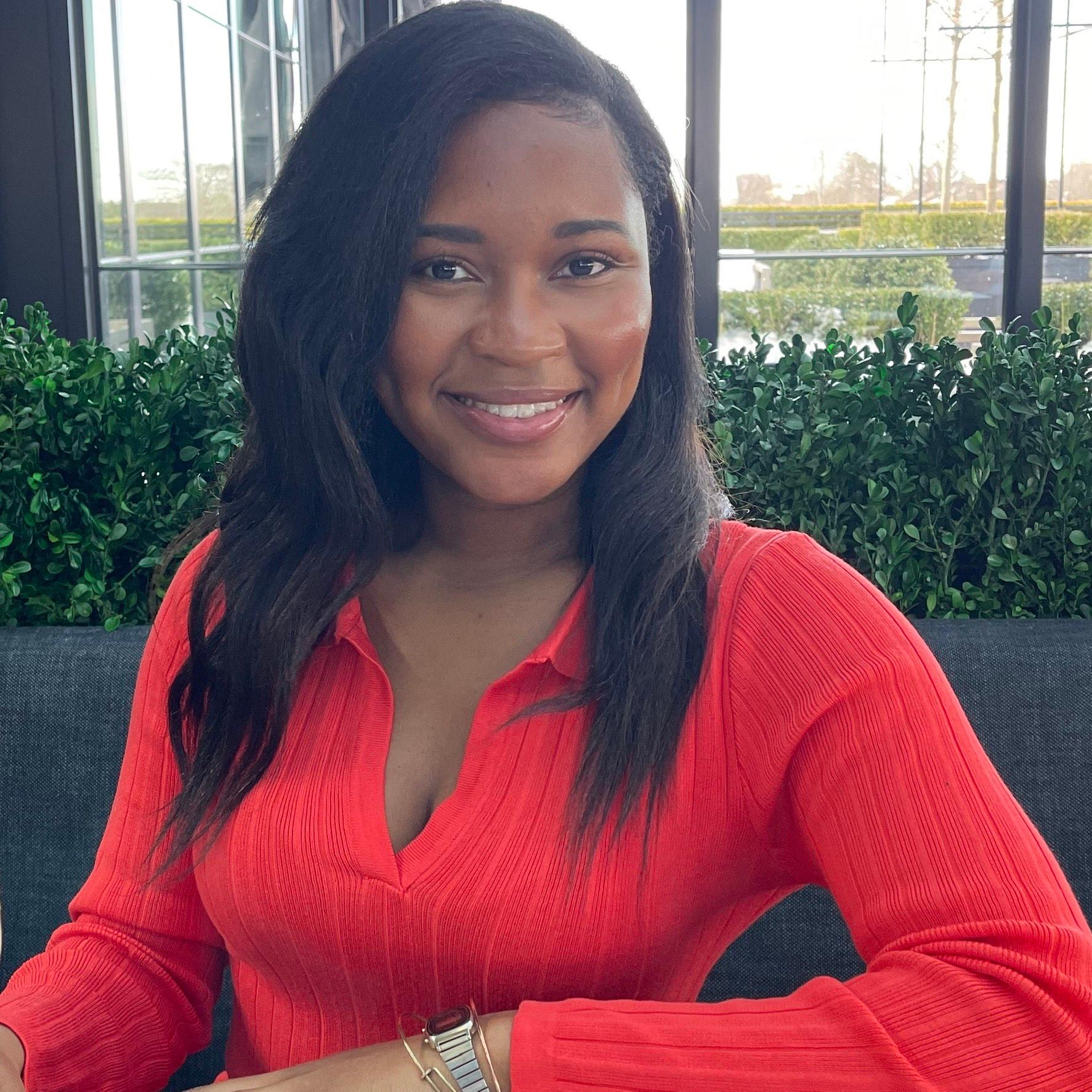Nowadays, the words diversity, equity, and inclusion (DEI) and allyship sound more like buzzwords as corporations, educational institutions, and even some states backpedal on their DEI initiatives. As an inclusion strategist and an outspoken woman, Amber Cabral is making it her duty to ensure that the importance of DEI within the workplace is not treated as secondary.
By leveraging the power of communication, Amber has unlocked ways to have tough conversations about equity in both personal and professional environments without tainting your reputation. She generously shared some of her strategies in her books ‘Say More About That’ and ‘Allies and Advocates’ and most recently in her TED-Ed talk titled ‘3 steps to better connect with your fellow humans.’
Her Agenda had the opportunity to talk to Amber about DEI, how to navigate the cultural changes surrounding it, and most importantly, how to advocate for equity confidently.
Her Agenda: How did you get into your line of work?
Amber Cabral: I’m from Detroit, and I used to work at BlueCross BlueShield in Michigan. I’ve always been a pretty outspoken, verbal employee. Around the time when people started talking about diversity, I was voluntold to be on the diversity counsel that was being formed at the company. I ended up loving it! It was right up my alley. That’s how my interest got piqued. I did diversity work at BlueCross the entire time. I left Michigan, moved to Georgia and I didn’t take the diversity work with me. I missed it. I decided to quit my job and to do bartending. Then, a friend of mine reached out with an opportunity at Walmart. I accepted the opportunity at Walmart to lead the global mentoring program. I immediately realized we weren’t mentoring across identity, so I wanted to figure out how to do that. From there, I was exposed to more opportunities around mentorship at Walmart. What came out of all of this was a plan that had to be rolled out across the entire company through the culture and diversity recruitment department. Then my job became a diversity strategist officially. In terms of my interests, diversity has always been there. I always recognized when people were misrepresented.
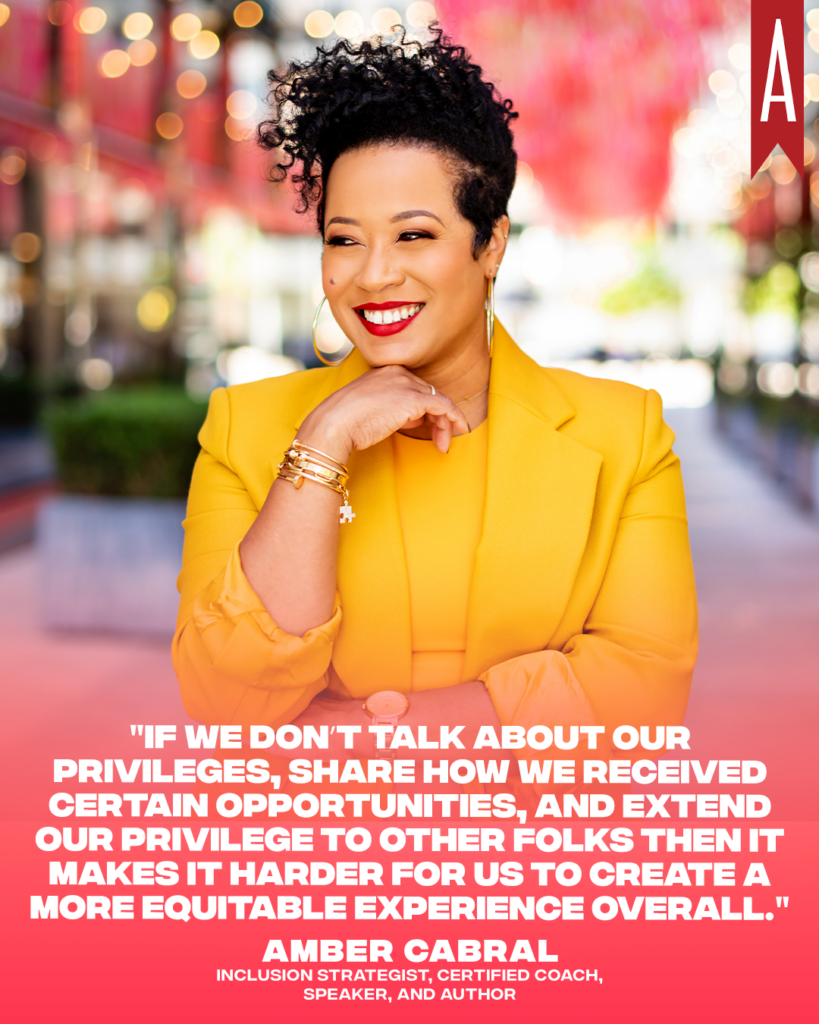
Her Agenda: I love how you were able to recognize your passion for diversity and align yourself with opportunities related to that. I also find it interesting that you describe yourself as “outspoken.”
Amber Cabral: It’s not a popular thing to call yourself ‘outspoken,’ especially if you’re an employee at someone’s company. I think I’m an outspoken person in general, which is also why I’m clear about how equity works. In fact, when you talk about equity work, it’s really important to realize how powerful it is to communicate well and also be willing to communicate. A lot of employees aren’t, and for valid reasons, like not wanting to put themselves under scrutiny. Being outspoken is an unpopular trait, but there’s a way to do it where it’s well received.
Her Agenda: Your motto is ‘I fight for fair.’ Can you share an experience where you had to ‘fight for fair’ for yourself and for someone else?
Amber Cabral: I have hundreds of them, buta workplace example that comes to mind is while I was working at Walmart, I took on a couple of direct reports. As I was hiring, we found a candidate we wanted to extend an offer to. The offer was for $60,000. HR made a mistake and put in $55,000 when they sent the offer. I noticed the error in the email, and I informed HR about the mistake. They responded nonchalantly saying, ‘Well, she already accepted it, so it’s fine,’ and I let them know it was not fine. She should be paid the amount we discussed. I had to go through a lot to get this changed, like pulling in my leadership to make sure people understood this is a young, Black woman growing her career, and $5,000 less is a big deal. So this is what I mean when I say, ‘I fight for fair.’ Very often, we get opportunities that are good, but we have to question if it’s fair. Am I being treated in a way that justifies the level of work I am doing, the amount of visibility I am doing, and the way I’m representing this corporation and its values? When the answer is no, we have to figure out how to respectfully and deliberately push back and make sure when this comes to life it will meet the equitable standard. S, fighting for fair is saying this is not an equitable experience for me or for anybody else.
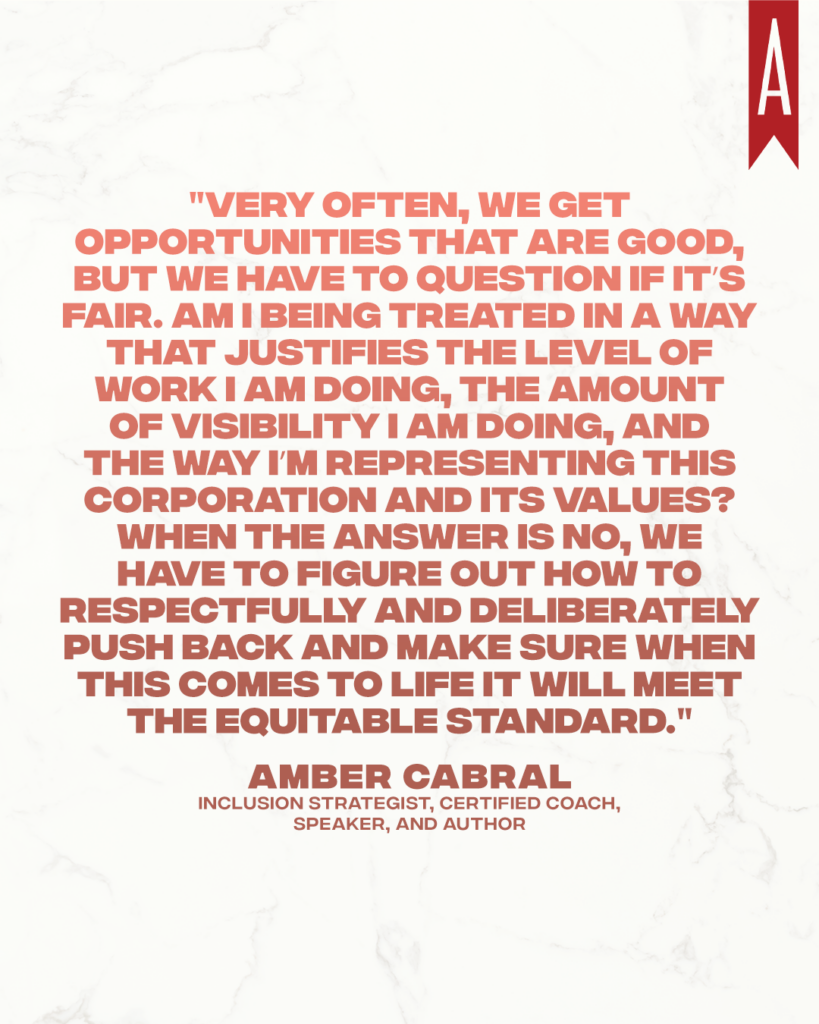
Her Agenda: Why do we have a fear of speaking up? What is one way we can overcome this?
Amber Cabral: Personal risk. This can be a personal risk in a job, or maybe you’re in a new environment, and you’re not sure how people will react to what you say. It can be that you may feel like you’re not the right person to say it. I think each of these scenarios can have different solutions. The first solution is everyone can be better at being willing to do it. Unfortunately, a lot of folks aren’t even willing. They prefer to accept what’s handed to them because they don’t want to rock the boat or get any backlash. I think it’s beneficial if we highlight more stories of people who speak up and receive the outcome they want. There should be more conversation about these moments to encourage people to say something. One of the things I prioritize in my work is giving people the language, the tone, and the approach so people understand they can take those steps and it doesn’t have to tear the relationship apart.
Her Agenda: You have your own podcast titled Guilty Privilege Podcast. What was the driving force for creating your podcast?
Amber Cabral: Folks wanted to hear more about equity and, specifically, allyship. I wrote about allyship in my book, but people wanted to hear more about these situations happening in real life. I think what the podcast does is take DEI out of the workplace environment and move it more into what equity looks like every day. It isn’t something that only belongs in workplace training or conversations. It’s more about your day-to-day experiences and questioning how you bring equity to life. I wanted to have a podcast that showcased this so people would understand what equity really is.
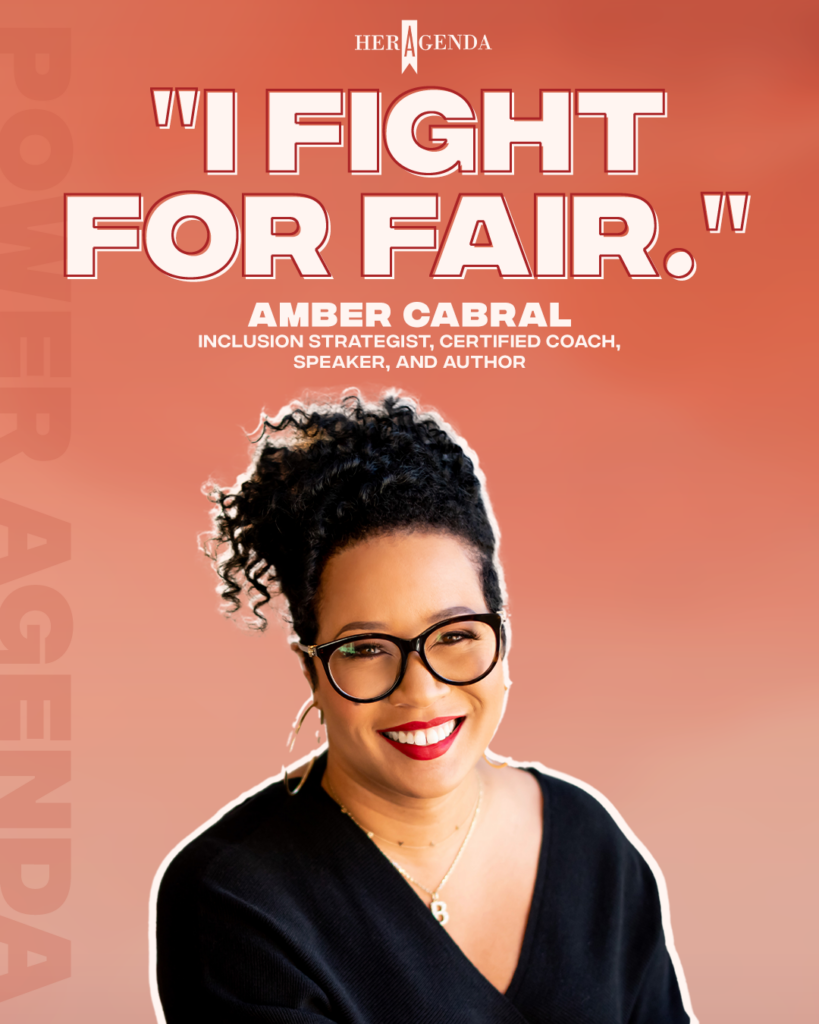
Her Agenda: What’s the meaning behind the name of your podcast ‘Guilty Privilege?’ I never heard this phrase before.
Amber Cabral: I think privilege is something most of us feel guilty about when it’s shown to us. A little bit of shame comes up when our privilege is spotlighted. I wanted a title that was catchy and also to shift the narrative around privilege because if we know our privileges, we can use them and possibly make an impact. If we don’t talk about our privileges, share how we received certain opportunities, and extend our privilege to other folks then it makes it harder for us to create a more equitable experience overall.
Her Agenda: You published a book, Say More About That:…And Other Ways to Speak Up, Push Back, and Advocate for Yourself and Others. Congratulations on that! In this book, you provide a complete communications toolkit for equity advocacy. Can you share more about the importance of this toolkit?
Amber Cabral: I think people don’t know what to say when having tough equity conversations. Sometimes, I think we want to say it but don’t know how. There’s a way to say [something] and a way to tell your boss about things that aren’t working effectively. What I aimed to do with the toolkit is provide people with the literal language I would use with the caveat for folks to adapt it to themselves. I also provided people with the awareness that your communication also includes your body language, your tone, and being thoughtful about the timing you’re having this conversation. We have to get more practice in saying what we want to say. I want to make sure people have the tools they need to speak up in tough situations to have the kind of workplace experiences we want to have.
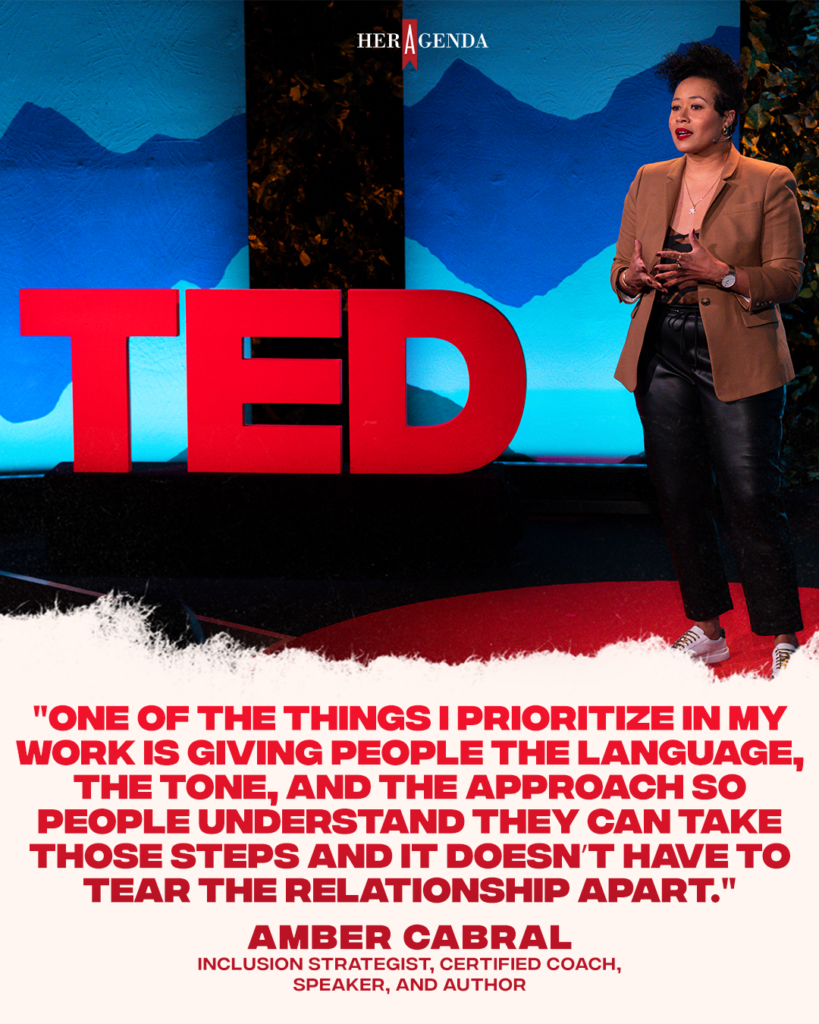
Her Agenda: What about in the instances when someone does speak up, and they don’t receive the response they wanted?
Amber Cabral: This is why it’s important to get clear with your boundaries. Ask yourself, ‘Is this a violation of my boundaries, or is this a communication issue?’ Then, explore solutions that can be used to help you and the other person find common ground. It doesn’t sound confrontational or pushy. What you’re trying to communicate is that you want to be a great employee but you’re not getting what you need to do that. I think it’s also important to realize when we say things, people are going to react and it may be good or bad.
Her Agenda: The words diversity, inclusion, and equity are buzzwords, and they’ve been going around a lot lately, especially as a lot of companies rethink their diversity, inclusion, and equity practices. What advice would you recommend to someone being impacted by the DEI changes happening in their workplace?
Amber Cabral: If you want the equity we’re talking about in all these trainings we’re doing, or if you want the opportunities that you believe should be available to Black women, someone has to say something. A lot of the conversations happening in the DEI space have been very centered around the oppression of certain identities, but what we’re not thinking about is that we’re having these conversations around the white folks who have the power. At some point, the conversation has to shift to collaboration and connection. I think we also have to decide what our boundaries are because work has to work for us. When it doesn’t, we’re more stressed out. So, the first thing to get clear on is what you want work to feel like, how you want to experience leadership, and what kind of relationships you want to have in the workplace. So it’s important to establish boundaries around this, so when they get crossed, you can step back and determine if this is a conversation that needs to be had.
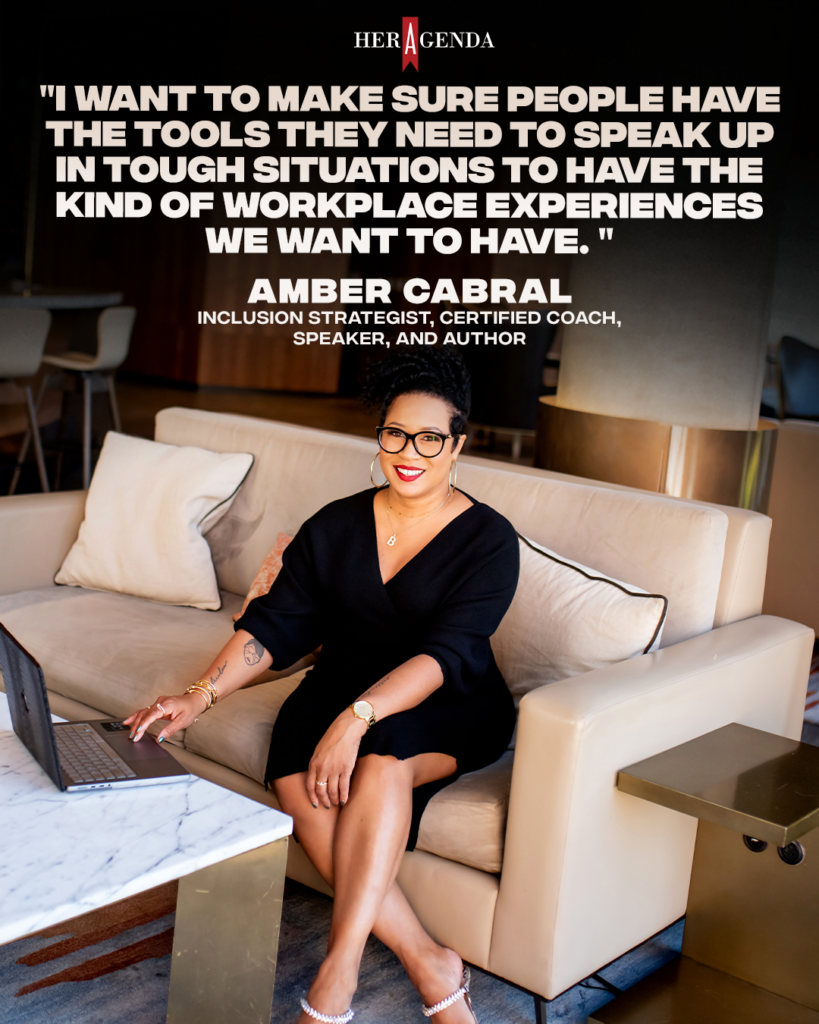
Her Agenda: You have your TED-Ed Talk called Humaning Well. The title is so intriguing. Can you share more about your TED-Ed Talk and what viewers can take away from it? Amber Cabral: My TED talk gives you three steps to be a more impactful ally. I intentionally avoid the word allyship in the title, and I intentionally avoid saying the word allyship until the end of the talk. The reason I avoid it is that we are in a climate right now where people are hearing those buzzwords and categorize it as ‘wokeism.’ What I wanted was a talk where people could receive the information before hearing the words. So, from the talk, you’ll learn three really simple but not easy steps you can follow to be a more impactful ally in your day-to-day life.
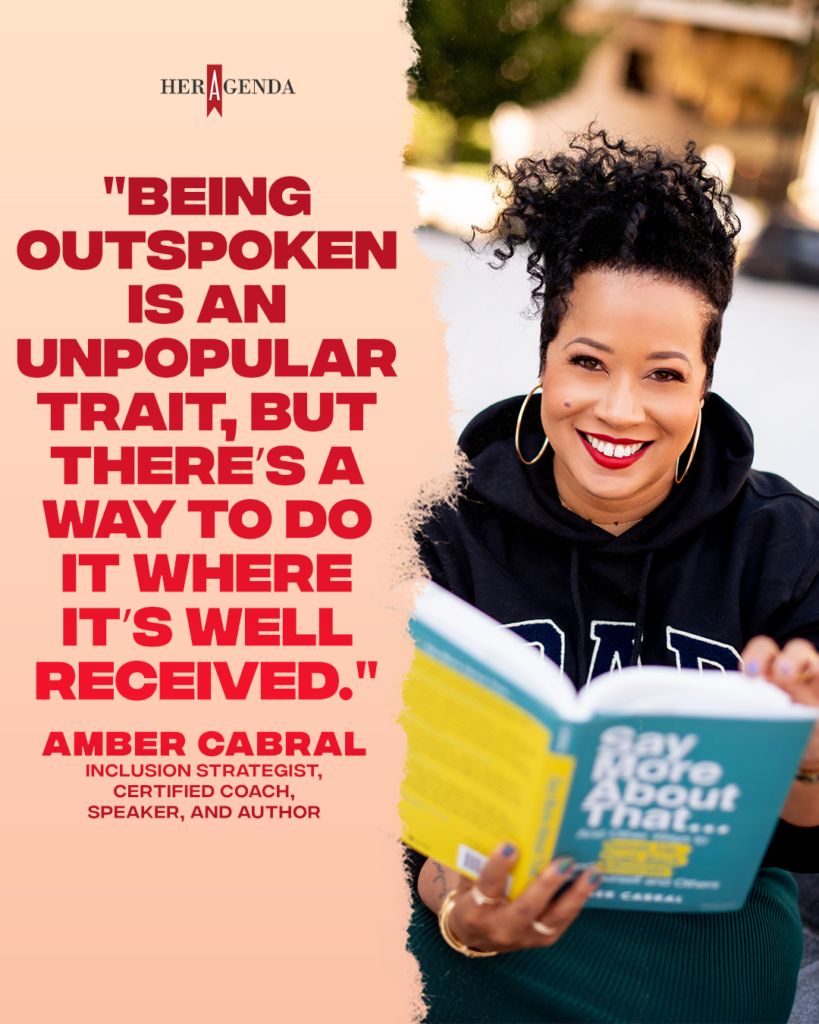
[Editor’s note: this feature has been edited for length and clarity.]

